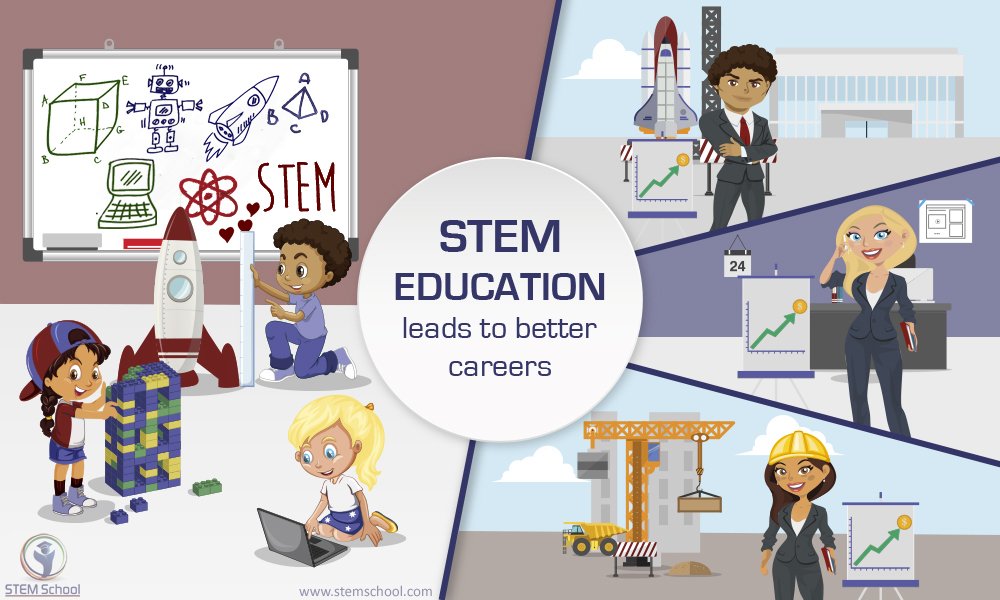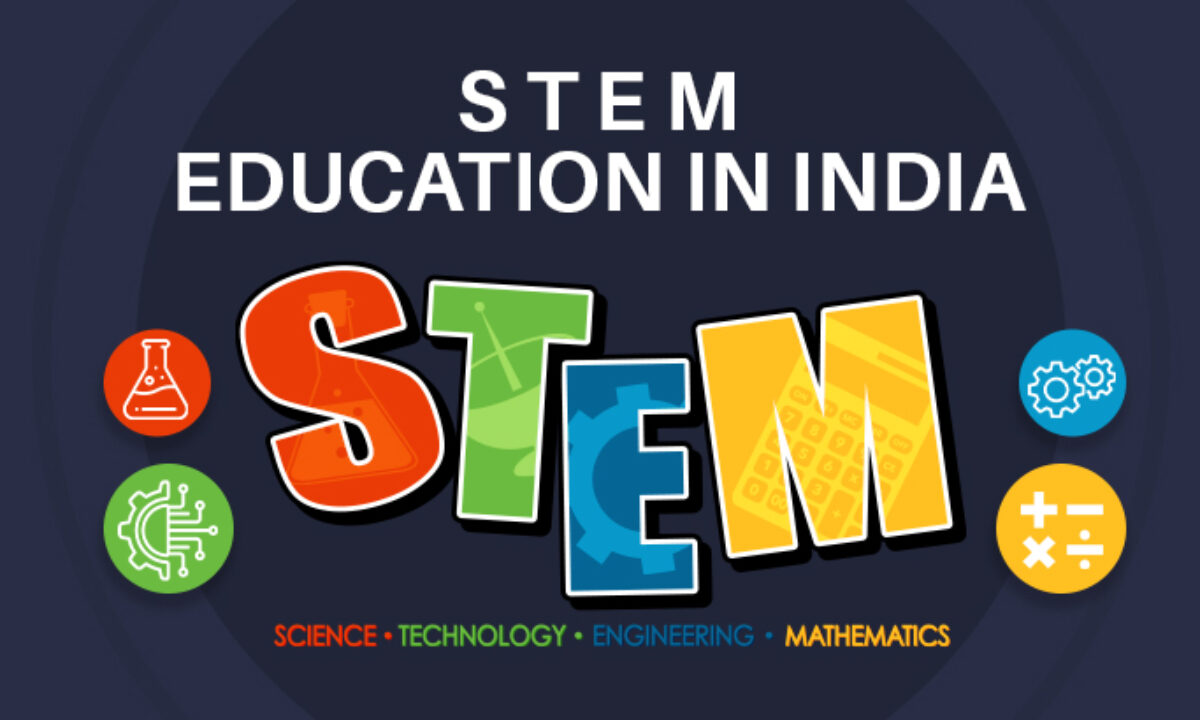The ongoing waves of technology in every sphere of our lives demand a strong foundation for STEM education in India. STEM stands for Science, Technology, Engineering, and Mathematics. It represents an integrated approach to learning that fosters critical thinking, problem-solving, and creativity.
From advancements in artificial intelligence to the rise of renewable energy, STEM-related industries are at the forefront of innovation and economic growth. Thus, offering STEM education becomes imperative to meet the increasing demand for STEM professionals in India’s rapidly growing technology, engineering, and manufacturing sectors.
This article will delve into the details of STEM education. Also, it will highlight why it is necessary for children in India, exploring its significance in a world driven by innovation and technology.
STEM Education – What Is It? And how is it going to help the Indian Education System?
The acronym STEM (Science, Technology, Engineering, and Mathematics) was introduced in the year 2001 by the scientific administrators at the U.S National Science Foundation. A robust STEM education system creates critical thinkers, problem-solvers, and next-generation innovators.
By embracing coding, robotics, and digital learning, STEM sets the stage for a tech-savvy workforce to thrive in the digital era. Thus, STEM education is at the forefront of this trend, preparing students for tomorrow’s jobs.
In India, where start-ups are flourishing, individuals with STEM backgrounds are at the helm of ground-breaking innovations. They can contribute significantly to the entrepreneurial landscape.
The Benefits of STEM Education in India

There are many wonderful benefits offered by STEM education in India. However, some of them are given below:
- It explains to the students how they can solve real-life problems by using the knowledge they acquire from STEM learning.
- Moreover, it teaches students various useful innovative skills, such as computational thinking, problem-solving skills, creative thinking, logical reasoning, etc. Thus, they get better at decision-making and develop good observation power.
- The students will understand the true value of teamwork when they engage in performing STEM-related activities together.
- Also, the students will understand the subject easily, which they feel is difficult to understand through theoretical means.
- STEM education is also beneficial for students who suffer from issues like ADHD (Attention-Deficit/Hyperactivity Disorder).
- Also, STEM learning helps students transform from random users of technology to thoughtful users. For example, kids love interacting with gadgets like smartphones, tablets, etc. STEM learning can help them understand the inner mechanisms of these devices.
- Children learn to score good marks and understand the real-life implementations of the concepts learned through STEM education.
- In addition, STEM education creates a very good learning environment that promotes hands-on learning experiences. Thus, it helps to evolve the mindset of the students.
Types of Challenges of Using STEM Education in India
We have discussed the importance of implementing STEM education in India. Nonetheless, let’s now look at the challenges of using STEM education in India.
Misconception around It:
A misconception about STEM education among educators is that it will divert students from their regular studies. Also, this belief says that they will not give proper attention to their textbook curriculum in that stipulated amount of time. However, this is not true. STEM learning can go hand-in-hand with the academic curriculum and cultivate the young innovators of the future.
Gaps in the Existing Structure:
The STEM education program mostly starts in middle school. However, according to experts, STEM education in India must be introduced from elementary school. Thus, students will develop a solid foundation in STEM-related subjects.
Lack of Inclusivity:
The STEM education in India is for every student. However, it is commonly observed that only the naturally motivated and well-prepared students benefit more from this STEM learning program than the under-performing students. So, teachers’ responsibility is to ensure that all the students are on the same level of STEM education. If a student understands a concept at a slow pace, then the teacher must provide the required guidance to that individual student.
Lack of Access to All:
There is a gender gap in STEM fields, with fewer women pursuing STEM careers. To bridge this gap, it is vital to encourage girls to engage in STEM activities and address stereotypes. Also, rural areas often lack access to quality STEM education. Expanding digital and educational infrastructure can help ensure that STEM education is accessible to all.
No Suitable Training for Teachers:
Effective STEM education requires well-trained teachers who can inspire and guide students. However, India barely has such trained and efficient teachers. So, providing teacher training programs can enhance the quality of STEM education in India.
Is STEM Education Crucial for Increasing Future Job Opportunities in India?
STEM education is crucial for future job opportunities for the following reasons –
1. Meeting the Demands of the Job Market
STEM professionals are in high demand across industries, from data analysts and software developers to biomedical researchers and renewable energy specialists. Thus, the job market in India and other areas is undergoing a significant transformation, with increasing roles requiring expertise in STEM fields.
2. Driving Technological Innovation
By fostering critical thinking, problem-solving, and creativity, STEM education nurtures a mindset that encourages students to develop innovative solutions to complex challenges. This ability to drive technological innovation is crucial for future job opportunities in emerging fields.
3. Tackling Global Challenges
The world needs individuals who can apply scientific knowledge and engineering principles to find innovative solutions to these complex issues. Thus, STEM education is vital in addressing global challenges such as climate change, healthcare, and sustainable development.

In A Nutshell
The right time to implement STEM education in India in every school in the country is here. The usage of tech-advanced gadgets signifies that our next generation of kids loves to interact with technology. They spend countless hours using technology in education. So, if we train them from an early age with STEM education in India, future scientists and researchers will grow soon. Thus, we can shape future talents who will make their parents and their entire nation proud with their unique ideas and inventions. Also, they will make things that will be useful in combating real-life problems.
Hence, it is the responsibility of parents and teachers to motivate and spread awareness about STEM education in India so young minds will benefit from it.
FAQs
1. What Is STEM Education?
STEM stands for science, technology, engineering, and mathematics. The interdisciplinary program introduced in the education system will provide students with a platform for innovation and creativity.
2. How Is STEM Education Important?
STEM education is important to develop skills and concepts among the students. It focuses on skill-based learning, unlike the traditional methods of learning, which were focused on memorization techniques. Also, it makes the students employable in companies and organizations.
3. How Does STEM Education Help Students?
STEM education in India and other areas helps students in their holistic growth and development. It builds creative thinking among the students. Also, it makes them socially responsible citizens. Moreover, STEM education helps them learn important skills for the future, which makes them employable.
4. What Are The Components Of STEM Education?
The major components of STEM education include:
- Problem-based Learning
- Rigorous Learning
- School Community and Belonging
- Career, Technology, and Life Skills
- Personalization of Learning
- Connection to the Broader and External Community



Comments 0